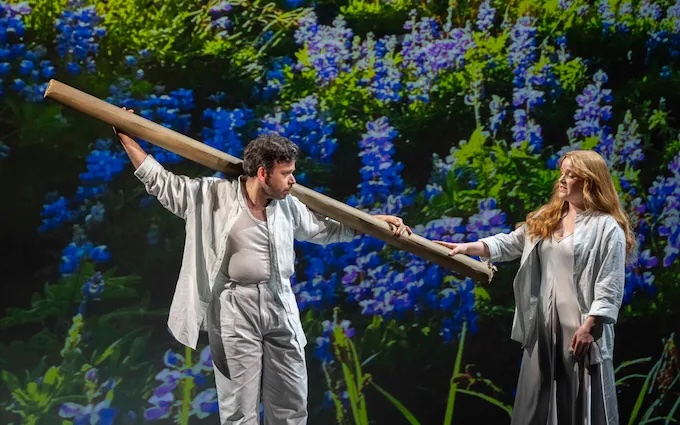
**
Anthony Bolton quite rightly beamed with pride as he was generously received at his curtain call as composer of this new work receiving its premier (and one of two performances) at Grange Park Opera. The response for the production team including director David Pountney was rather more muted. The singers and Gascoigne Orchestra conductor George Jackson fared well in the volume of the audience’s applause. This all seemed correct.
Yet it is not really the production team’s fault that this venture was so-so, despite the decision to throw video artistry at it in an attempt to create some of the atmosphere and drama that was sadly lacking in the opera itself. A comment by one of the audience members I happened to hear summed up much of the problem in that she said she had forgotten how beautiful the Shakespeare poetry is. That’s the rub. The Tempest is not ideal for an opera and is often not that great staged.

Even in the hands (and voice) of a splendidly strong Brett Polegato as Prospero, does the acting come alive. His daughter Miranda and her wet (no pun intended) beau Ferdinand make little impact dramatically, the latter not helped by a distinctly unflattering costume. He might have been the first man she had ever seen, but I would have still told him to do up his shirt. The voices of Ffion Edwards and Luis Gomes meld together beautifully when allowed to but Gomes in particular is given little to work with.
David Haneke’s videos, shown frequently on screens that are moved around by the stage crew, are effective enough, while the videos on the backdrop itself are too often reminiscent of summer holiday tv advertisements interspersed with swamp scenes for Andreas Jankowitsch’s rather charming and likeable Caliban. Prospero’s library becomes more of a cod mad scientist’s den with dials and gizmos and scribbled calculations and formulas. It brought to mind the Wizard of Oz. We also had that rather overdone trope of the ruined amusement park. Longborough did this idea rather better a few years ago.

I felt rather sorry for Richard Suart and Adrian Thompson playing sadly unfunny Stephano and Trinculo as not a laugh or titter was heard from the audience. Even their outlandish clown costumes from April Dalton did nothing. Andreas Jankowitsch was much funnier.
There is also little to say about the direction and characterisation of the arch baddies, all taken well by Philip Clieve as Antonio, Harry Nicoll as Gonzalo and William Dazeley as Alonso.
Hugh Cutting did his best as a bouncy enough Ariel, and sweetly sung, but cheek did not make up for charm.

The best vocal writing is for Prospero, and fortunately that is where the strongest performance was, from Brett Polegato. Some of his scenes interacting with others (Miranada and Ariel particularly) are pleasant but it is his grand solo arias that stand out.
Equally unnoteworthy were the Spirits of the island in awful white bodystockings, as they performed a sort of nervous but inquisitive near robotic balletic choreography.
Perhaps a concert performance of Bolton’s work would have worked better as his musicianship is where his skill is strongest. In that format we could concentrate even more on the differing atmospheres and moods created in his writing without the distraction of the (little) stagecraft.
As an aside in a brief chat Sir David bemoaned the funding problem of Welsh National Opera with its funding not being what it would like. But I did ponder on how part of problems for that company, which he ran, is the ending of the love affair of the people of Wales with the company that has been happening over the last couple of decades which I suspect is partly down to programming and productions for which several people have been in part responsible.
Main image: Luis Gomes and Ffion Edwards
Images: Marc Brenner